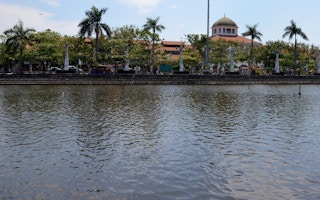Development experts, researchers, planners, individual practitioners, as well as institutions concerned about making cities more resilient to the impact of climate change can now connect with one another through a new network called Asian Cities Climate Change Resilience Network (ACCCRN).
The network, an expanded version of an initiative of the Rockefeller Foundation under the same name, will focus on involving more practitioners in the area of building resilience of urban communities, and will be led by global humanitarian organisation Mercy Corps. The non-profit groups launched the expanded ACCCRN at the first Asia-Pacific Forum on Urban Resilience and Adaptation held in Bangkok on February 12.
The new network is encouraging more experts to become part of the membership-based platform, which would offer them the avenue to create and share knowledge, access resources such as studies and documentaries of successful climate resilience initiatives and an opportunity to influence agendas on urban resilience to the impact of climate change.
By connecting resilience practitioners and their base institutions across Asia under the ACCCRN, the network aims to build a more inclusive approach to urban climate change resilience, ACCCRN said on its new website.
ACCCRN was launched by Rockefeller in 2008 as a catalyst to raise funds for and galvanise action on building climate resilience for vulnerable communities in Asia, including Bangladesh, India, Indonesia, the Philippines, Thailand and Vietnam. It aimed to create models and methods for assessing and addressing climate risks in these cities, Rockefeller said.
“
This will help cities address day-to-day challenges, while also preparing them for whatever shocks may come their way, making them able to realise a resilience dividend
Ashvin Dayal, associate vice president, Rockefeller Foundation
Experts consider urban populations to be highly vulnerable to extreme weather events such as strong typhoons, particularly in the Asia Pacific region, which is dubbed by the United Nations as the world’s most disaster-prone region. The region has been the hardest hit by natural disasters, with reported deaths of nearly 714,000 between 2004 and 2013, the UN said in a report.
Jim Jarvie, director of climate change, environment and natural resources at Mercy Corps, and has been appointed as ACCCRN network director, noted, “Increasing frequency and intensity of storms, unpredictable growing seasons, floods and drought are becoming a day-to-day climate reality in many parts of the world.”
Protecting lives and livelihoods in a rapidly urbanising region, where poor and migrant populations are highly vulnerable, would require approaches embedded in governance, Jarvie said.
ACCCRN has already established local networks in several countries as the programme has grown to more than 50 cities since it started. Mercy Corps has been one of its partners since 2009, implementing emergency and disaster-preparedness programmes in Indonesia’s Bandar Lampung and Semarang. They are just two of the coastal cities in Asia heavily threatened by worsening floods due to rainfall, soil erosion and rising sea levels.
With the new ACCCRN, Mercy Corps and Rockefeller hope to build a larger coalition of experts by partnering with other existing local, national and regional networks.
The launch of the new network is timely as it helps “put resilience principles into practice”, said Ashvin Dayal, associate vice president of the Rockefeller Foundation, adding that it will enable practitioners to connect, share experiences and advance urban resilience to climate change.
“This will help cities address day-to-day challenges, while also preparing them for whatever shocks may come their way, making them able to realise a resilience dividend,” said Dayal.

















